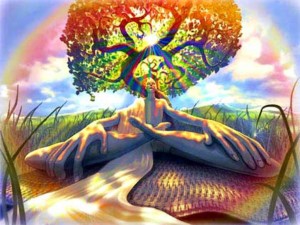Bloodstream Sermon, Part 4
Buddha is Sanskrit for what you call aware, miraculously aware. Responding, arching your brows blinking your eyes, moving your hands and feet, it’s all your miraculously aware nature. And this nature is the mind. And the mind is the Buddha. And the Buddha is the path. And the path is Zen. But the word Zen is one that remains a puzzle to both mortals and sages. Seeing your nature is Zen. Unless you see your nature, it’s not Zen.
Even if you can explain thousands of sutras and shastras, unless you see your own nature yours is the teaching of a mortal, not a Buddha. The true Way is sublime. It can’t be expressed in language. Of what use are scriptures? But someone who sees his own nature finds the Way, even if he can’t read a word. Someone who sees his nature is a Buddha. And since a Buddha’s body is intrinsically pure and unsullied, and everything he says is an expression of his mind, being basically empty, a buddha can’t be found in words or anywhere in the Twelvefold Canon.
These passages are the very Heart of Zen. As Bodhidharma eloquently states, Buddha is Sanskrit for being miraculously aware. Notice here that he’s not saying “your awareness”; no, this is not constitutive of the skandhic mind—but the very Unborn Buddha Mind! It is this Mind who sees through the eyes of awareness—in this sense it’s the Tathagatas’ alone and “no one” else’s. When this “awareness” is present, it is as if the Buddhas themselves are arching your eyebrows, moving your every limb, making it all miraculously awake and alive and vibrating with Buddha-nature—it is when you and the Dharmakaya are One—One Mind and Spirit. This is the very nature of the path—because it is the very Buddha Nature Itself—Alive Zen, remarkable, ineffable Wordless Zen that speaks to the very Heart of the Tathagatas. Zen is the language of the Buddhas and unless Buddha-nature is seen of Its own accord then it’s not Zen. Can you see the incredible self-realization in all this? Awareness is Buddha-nature Recollecting Itself and It is devoid of words—that’s why the illiterate Sixth Patriarch, Hui Neng, is arguably the most influential Zen Master ever—because he so freely and un-obstructively became the vehicle through which the Buddha-nature found self-expression.
The Way is basically perfect. It doesn’t require perfecting. The Way has no form or sound. It’s subtle and hard to perceive. It’s like when you drink water: you know how hot or cold it is, but you can’t tell others. Of that which only a Tathagata knows men and gods remain unaware. The awareness of mortals falls short. As long as they’re attached to appearances, they’re unaware that their minds are empty.
And by mistakenly clinging to the appearance of things they lose the Way. If you know that everything comes from the mind, don’t become attached. Once attached, you’re unaware. But once you see your own nature, the entire Canon becomes so much prose. Its thousands of sutras and shastras only amount to a clear mind. Understanding comes in mid-sentence. What good are doctrines? The ultimate Truth is beyond words. Doctrines are words.
They’re not the Way. The Way is wordless. Words are illusions. They’re no different from things that appear in your dreams at night, be they palaces or carriages, forested parks or lakeside ‘lions. Don’t conceive any delight for such things. They’re all cradles of rebirth. Keep this in mind when you approach death. Don’t cling to appearances, and you’ll break through all barriers. A moment’s hesitation and you’ll be under the spell of devils. Your real body is pure and impervious. But because of delusions you’re unaware of it. And because of this you suffer karma in vain. Wherever you find delight, you find bondage. But once you awaken to your original body and mind, you’re no longer bound by attachments.
Being instilled with the Zen Mind one transcends the sphere of dissatisfied gods and mortals—that incorrigible sensate realm that is hopelessly addicted to the bottomless belly of appearances; never being filled-up they are unaware that their Mind is originally empty of all this garbage. Mind-Only is no mere doctrine but a real Turn-About wherein the discovery is made of That which is the sole image-maker; if one remains attached to the images then one is indelibly UNaware and then even the scriptures themselves are useless tools in the hands of the feeble-minded. Truth is what is revealed “between” the lines of scripture—if one remains focused exclusively on those lines themselves then one is forever blinded to the Truth that is Beyond Words. Doctrine means being attached to dead-words and is far from the Zen Way that is vibrant and Pulsating with bodhipower; Bodhidharma advises to consider words as nothing more than those phantasmal images procured from sleep—within that dreaming dungeon-mind that is the very cradle of rebirth. He says to even keep this in mind when death itself approaches—because death is the final phenomenal barrier that needs to be broken in order to embrace one’s true Buddha-nature. The body-consciousness is the shell wherein the bodhi-spirit is entrapped; unless one breaks-free from the shell one is never “Awakened” to the true self-realization of the Buddhakaya that is like boundless space. The following video from the Dragon-Mind of Zen series depicts what it’s like to be free from the Mind of Darkness and seeing freely with the Mind of Zen.

